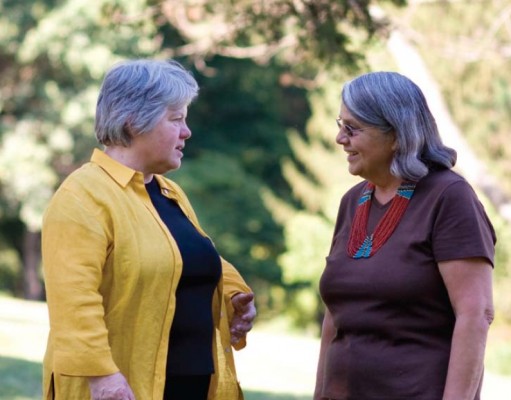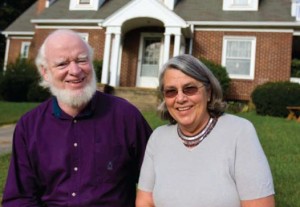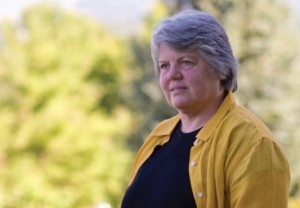
A leadership change has occurred at EMU’s annual Summer Peacebuilding Institute (SPI), with long-time director Pat Hostetter Martin retiring. Her replacement, Sue Williams, moved to Harrisonburg in the early fall from her previous base in the United Kingdom.
CJP director Lynn Roth had warm words of praise for Martin’s years of service – not just for her 11 years at EMU but also for her 18 years of service with Mennonite Central Committee, focused upon East Asia. “Pat’s commitment, passion, vision, hope and wisdom have been inspiring to people throughout the world,” said Roth.
In announcing Sue Williams’ appointment, Lynn Roth emphasized the wealth of experience she brings to EMU. “Sue comes to this position with approximately 25 years of experience in the conflict transformation field. Since 2000 she has been working as an independent consultant, assisting and training in conflict analysis, management, prevention of escalation, program design, strategic reviews and evaluation of projects. She has done this in countries including Rwanda, Northern Ireland, Cambodia, Guatemala, Sri Lanka, Kenya and Myanmar.”
Like Martin, Williams has spent her entire adult life working in some way to increase peace in the world. Both women worked in tandem with their husbands for much of their professional lives. Williams is no longer able to do so – her husband, Steve, died of a heart attack last December just after returning from a consultation in Cyprus and re-joining his wife at their home in Milton Keynes, England. She had just returned home from a consultation in Rwanda. Sue Williams’ move to SPI is part of her journey toward living and working without her husband to whom she was married for 26 years.

Retiree: Pat Hostetter Martin
Work Experience
At age 23, Martin joined Mennonite Central Committee (MCC) to work in Vietnam. She was assigned to work in Quang Ngai City in central Vietnam where there was heavy U.S. bombing and many refugees. Martin and other volunteers offered medical care, food aid, material assistance and vocational classes to internally displaced people.
In 1968, Pat married Earl Martin, also a Mennonite worker in Vietnam. They finished their three-year term together, returned to the United States for further schooling, and then went back to Quang Ngai province for two years until the end of the war in 1975.
The Martins spent most of the 1980s and early 1990s working for MCC, including a three-and-a-half-year stint in the Philippines and nine years as co-secretaries for MCC’s East Asia program.
From the late 1990s to the present, Martin has studied and worked at EMU, playing a leadership role in SPI for 11 years.
Outstanding Personal Qualities
Open-door hospitality and egalitarian community living, as these examples show:
- From 1997 to the present, Pat and Earl have shared their home with close to 100 people from dozens of backgrounds and multiple religions. They have celebrated the marriages of three of these residents, plus the births of four of them. And they have hosted weekly community meals.
- Both Martins have been key players in the founding of Crossing Creeks, a therapeutic rural community near EMU where persons with persistent mental illness live, play and work together with staff and volunteers in a mutual search for well-being.
One (of Many) Challenges Faced
In 1975, the Martins were parents of two children, aged 1 and 3. A book by Earl, Reaching the Other Side, graphically describes his decision to stay behind during the chaos of the Communists’ takeover of South Vietnam, while the U.S. and their proxies fled. In an effort to protect their children, Pat took them aboard one of the last evacuation flights from their province. After almost five months of separation, the Martins re-united in Lagos, Nigeria, where Pat’s parents, B. Charles and Grace Hostetter, were living. (In 1993, Pat and Earl returned to Vietnam, spending six months as MCC’s interim country representatives and living in the northern part for the first time.)
Enjoyments
Time to play with her 3-year-old granddaughter, Sophia. Swimming, hiking and bicycle riding. Reading, almost a book a week. Writing: she and Earl hope to write a book with son Hans.
Church Affiliation
Shalom Mennonite Congregation in Harrisonburg, Virginia
Education
BA, social work, Goshen College, Indiana. Grad certificate, occupational therapy, San Jose State University, California.
MA in conflict transformation, EMU.
Strengths Given To SPI
Co-workers Bill Goldberg and Valerie Helbert have written: “Many are the times when we have seen Pat, in the middle of an important project with a deadline, stop what she was doing and devote as much time as was needed to someone who came into the office to talk. It didn’t matter if the person had an important matter or was discussing the day’s events. Pat gave the person her full attention for as long as was needed to send the person on their way feeling heard and understood and in better spirits. We see this as one of her most important assets, and the one that we will strive to maintain at SPI.”
Memorable Quotes
“I believe we are all called to be passionately who we are. I have spent my life trying to share who I am with other people, while trying to understand what they do and how and why they believe as they do. Of course, I have been changed by the people I’ve met, and I suppose some have been changed by meeting me.”
“I have come to believe there are many ways of experiencing God and of seeing God at work in this world, and I have come to respect them all. The most important lesson that Jesus gave us was the primacy of love, and that is how I try to live my faith now – through expressing love and receiving it from others, regardless of their religious or social backgrounds.”
A student asked Martin how healing happens in healthy families. She replied, “I don’t know, but I know it happens around food.”

New Director: Sue Williams
Work Experience
Too vast to list in full here, but highlights include:
- Special consultant to Folke Bernadotte Academy in Sweden where she has been a trainer in political mediation and dialogue for the mediation support unit of the United Nations’ Department of Political Affairs.
- Director of the policy and evaluation unit of INCORE at the University of Ulster and United Nations University in Northern Ireland.
- Five and a half years in key roles in the organization Responding to Conflict in the United Kingdom.
- Ten years with Quaker Peace and
Service, including two in Uganda during its civil war during the 1980s and a year in regional reconciliation work in Burundi, Kenya and other locations in East Africa.
About three decades ago, Williams was a librarian in Roanoke, Virginia, when she met her future husband while both were working to found a local peace center. After marrying in 1981, they joined Brethren Volunteer Service and moved to Haiti to work with street children. Thus began their lives in the service of victims of structural and other kinds of violence.
Outstanding Personal Qualities
Remains functional when the going gets tough. Tested and tempered by living and working in war zones, amid the nightmare of killings and dead bodies. Understands “survivor guilt,” after seeing many good people, including close colleagues, killed. Has chosen the path of non-violence, even when others around her were hiring armed guards or picking up arms themselves. Sue and Steve Williams long ago decided, “If we’re going to get killed, we might as well get killed doing something we believe in.” One (of Many) Challenges Faced “I was at a (Quaker) meeting in Oxford, England, when someone spoke about the biblical verse ‘Blessed are the pure in heart, for they will see God’(Matthew 5:8). I felt kicked in the stomach. You can’t be pure after the things I’ve seen.” One of the worst periods of “defilement” for Williams was 1984-87 and again in 1990-91, when she and her husband were trying to support peacebuilders in Uganda while 100,000 people were being killed, sometimes right outside the doors of their unguarded home. And then there was Rwanda and Burundi… “All the war zones have come back to me in nightmares. The bodies in the streets. The tastes and the smells of it. It stays with you for years.”
Enjoyments
Swimming and walking. Calisthenics in hotel rooms, when swimming and walking are not options. Prayer/meditation. Humor. Playing guitar. Weaving and gardening – “doing something constructive amid destruction.” Keeping a journal. “But I don’t do any of these things particularly well or regularly enough.”
Church Affiliation
Religious Society of Friends (Quakers)
Education
BA and MA, both degrees in French and politics, from Brown University in Rhode Island
Strengths To Offer SPI
Understanding the impact of violence and trauma on one’s psyche and ability to function as a peacebuilder. Also vast on-the- ground experience and lessons to offer, some of them contained in a monograph she co-authored, Working With Conflict: Skills and Strategies for Action (Zed Books, 2000), now circulating in 14 languages.
Memorable Quotes
“My work can be likened to pollination. I have worked in 40 or 50 countries, and each time I try to bring people examples of what has been done successfully or unsuccessfully elsewhere. Actually, it’s much harder to learn from success than from failure. If something failed, then obviously something has to change. But that doesn’t mean we should throw it all out; we should just decide what needs changing. This kind of cross-pollination can, with luck, open up possibilities that have not been considered before.”
“I will sit and talk with anyone. Excombatants are at least straight forward – they have an energy you can do something with. They are passionate about their country. You don’t want to throw that away. I find them easier to deal with than, for example, people in war entirely for their own greed – such as narco-, diamond- or human traffickers – who display no human interest in their country. But even they need to be at the table. I’m not trying to convert people, to make them share my values. They do not have to be converted for us to negotiate a way to have peace.”
